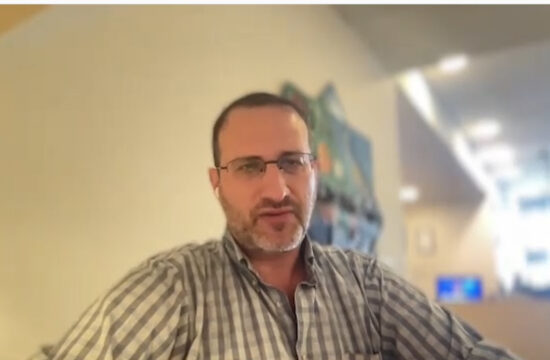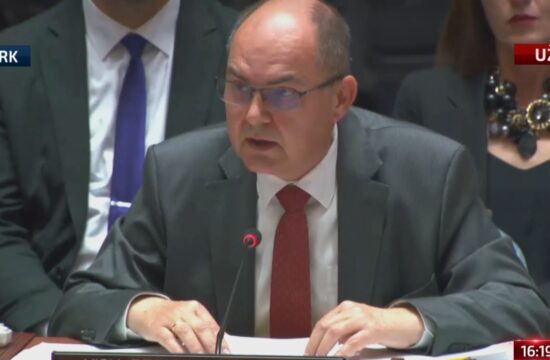
Professor Menachem Rosensaft, a former senior official of the World Jewish Congress who teaches at Cornell Law School, shared his deep concerns over the policy of Israeli Prime Minister Benjamin Netanyahu towards Palestinians, saying that he seems to be avoiding diplomatic process "under the pretext of not having a viable partner in them."
He is doing so, according to Rosensaft, by making the humanitarian conditions of Palestinian civilians in Gaza “as dire as possible,” which will eventually radicilise their sentiment.
“That has been his strategy for the past 14 years, and that explains why he has allowed Hamas to build itself up and be funded by Qatar to the tune of close to two billion dollars. As it turned out, his belief that he could manipulate Hamas was a disastrous misjudgment, and it was Hamas that manipulated him,” Rosensaft told N1.
Alternatives to Netanyahu?
Asked about a possibility of PM Netanyahu stepping down amidst the ongoing conflict and if there are any alternatives to him, Rosensaft mentioned a few examples in the past where governments changed their military or political leaderships during wartime. However, he does not think it could happen in Israel where Netanyahu “made it clear that his political survival is his first priority.”
There are a few alternatives to Netanyahu-led government, according to him, one of them being a willingness by enough members of Netanyahu’s Likud party to replace him as prime minister, which would enable Likud to try to form a less extreme government.
“Or, more likely in light of Netanyahu’s iron grip on the Likud Central Committee, a successful non-confidence motion that would result in new elections. In that case, the polls indicate that the party headed by Benny Gantz, the former chief of staff of the Israel Defense Forces and a former defense minister, would emerge as the largest block in the Knesset, the Israeli parliament, and Gantz would then be in a position to form a predominantly centrist government along the ideological lines of former Israeli prime ministers Yitzhak Rabin, Ehud Barak, and Ehud Olmert, all of whom engaged with the Palestinian Authority politically and diplomatically,” he explained.
Three other Israeli personalities are likely to play important roles in any post-Netanyahu political reality: opposition leader Yair Lapid, Israeli President Isaac Herzog, and former Foreign Minister Tzipi Livni who is now out of politics but is highly respected internationally, as are Herzog and Lapid, added Rosensaft.
‘It is Israel's obligation to defend itself against Hamas’
Commenting on the issue of civilian casualties in Israel's attempts to defeat Hamas, he stressed that Hamas continues to use the Palestinian population of Gaza “as collective human shields,” but that the Israeli forces need to find a balance to fight Hamas while “doing as much as it can to minimise Palestinian civilian casualties.”
He reiterated it is Israel's “obligation” to defend itself against Hamas and that the “definition of victory” for the State of Israel is elimination of Hamas as a threat to Israeli people.
“No state anywhere in the world would be expected to tolerate the presence on or near its borders of a gang of murderers and rapists who not only had committed systematic heinous crimes against the state’s citizens but had announced that they would do so again. What much of the international community is asking for is an end to the fighting in Gaza without the elimination of Hamas as a threat to Israel and its Jewish citizens and residents. This is simply untenable,” said Rosensaft.
At the same time, Rosensaft said, “the Israel government and the military must take the most severe measures against extremist Jewish settlers on the West Bank who violently attack Palestinian civilians there. The Israel-Hamas war in Gaza cannot be allowed to become a pretext for committing criminal acts against Palestinians on the West Bank.”
As for the genocide accusations against Israel, he called them “baseless,” noting that Israel “in no way intends to destroy the Palestinian people in Gaza” but to eliminate Hamas.” Genocide, Rosensaft explains, is a legal term that requires an intent to eliminate a particular group, “and it is clear that the Palestinian population will remain in Gaza after this conflict will have ended.”
Speaking about the “day after” the end of the conflict in Gaza, he recalled of US President Joe Biden's words saying that the focus must be on what happens after the war, which will require interrelated humanitarian and political processes.
It will take enormous amounts to take the lives of the Palestinians back to normal, according to him.
“The most immediate priority will have to be enabling Palestinian civilians to return to some sort of normal existence, which will require billions of dollars just to make places like Gaza City and Khan Yunis habitable again, and to rebuild the necessary infrastructures throughout Gaza,” he stressed.
Saudi Arabia, the Gulf States, Egypt, and Jordan, he deems, will be key players in this respect, together with the United States and the European Union.
Also, he added, it will take a huge reconstruction efforts to make the kibbutzim and other communities on the Israeli side of the border habitable again.
“My former boss, Ambassador Ronald S. Lauder, the president of the World Jewish Congress, was the first to call for a Marshall Plan for the Middle East long before October 7,” Rosensaft said. “He was and is absolutely correct in his judgment, only now the need for such a Marshall Plan, focused on both Gaza and the communities in southern Israel, has become critical.”
But, before it happens, departure of Israeli troops from Gaza would have to be conditioned on security measures acceptable to Israel, Rosensaft said, adding that no one responsible for or in any way involved in the “October 7 pogrom” can be a legitimate leader in the post-war Gaza.
Journalists must differentiate between support for Palestinians and calls for destruction of Israel
He also touched upon the issue of unbiased and fair reporting on Gaza war, emphasising the need of using “balanced language that does not reflect a prejudice.”
It is legitimate and appropriate to report on Palestinian civilian casualties in Gaza, but, on the other hand, criticism of Israeli actions or of Israeli policies is legitimate if it is honest, “but not if it seeks to hold Israel to an unreasonable standard or ignores Hamas’ ultimate responsibility for the war.”
“Finally, journalists have a responsibility to state clearly when a demonstration is antisemitic rather than pro-Palestinian – such as when a demonstration features calls for “death to Israel” or “death to the Jews”. Journalists must differentiate clearly between support for the Palestinians, which is absolutely legitimate, and calls for the destruction of Israel or hatred toward Jews, which is decidedly not,” he added.





Kakvo je tvoje mišljenje o ovome?
Budi prvi koji će ostaviti komentar!